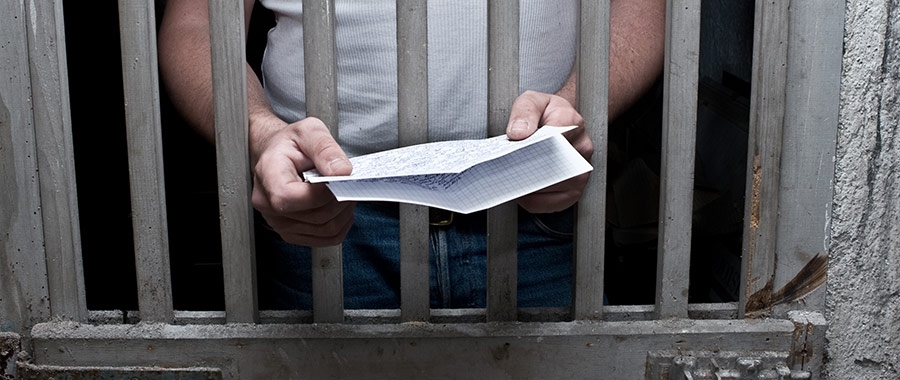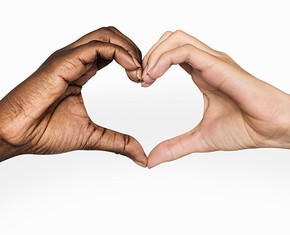The views expressed in our content reflect individual perspectives and do not represent the authoritative views of the Baha'i Faith.
The son of very close friends was arrested for a crime, and found guilty—and indeed, he was guilty. His mother called me for support.
At the time I learned of his conviction and incarceration, I was at a loss as to what I could possibly do to help him. Then, I remembered that he was gifted in writing, and suggested that he keep a journal of his experiences—and what he was doing spiritually and psychologically to come to terms with his transgression.
In that same letter, I offered to correspond with him (for the purposes of these articles, we’ll call him John, although that’s not his real name) if he felt comfortable doing so, but indicated that I didn’t want to intrude if he didn’t feel comfortable. John wrote back immediately and said he would welcome my letters. This began an exchange of correspondence that lasted for the next two and a half years.
In his third letter to me, knowing that I am a Baha’i, John asked about my Faith’s approach to redemption. I was at a loss at first, as I hadn’t really given it much thought—but I gave it some thought, looked into the Baha’i writings for guidance, and wrote back to him:
Dear John,
As always, it was wonderful to hear from you. Yes, I did pick up on that incredible quote for Nietzsche you penned on the outside of the envelope. My first reaction was one of tremendous reassurance that this “brother” is indeed finding his way. Is that not what we all should be striving for, finding the “why” to live?
It hits at the fundamental need in all of us to have a purpose for existing, and furthermore, not to lose sight of it and to bend continually all of our energies towards its pursuit.
One of the continual realities in our lives on this plane of existence is our need to be mindful of the systems of rewards and punishments our society has necessarily put in place in its attempt to mete out justice whenever one of society’s rules, regulations, or laws appears to be broken or violated. We aspire to make such regulatory standards and the processes and procedures for implementing them fair and just, but the very fact that we flawed individuals are the ones called upon to establish, understand, and implement them necessarily means that the pathways of doing so are fraught with challenges and our judgments replete with errors. In the long run all of those errors are inconsequential, because eventually and ultimately we must satisfy only the One with absolute authority Who will in the end make the final judgment:
The tribulations that have touched Us, the destitution from which We suffer, the various troubles with which We are encompassed, shall all pass away, as shall pass away the pleasures in which they delight and the affluence they enjoy. This is the truth which no man on earth can reject. The days in which We have been compelled to dwell in the dust will soon be ended, as will the days in which they occupied the seats of honor. God shall, assuredly, judge with truth between Us and them, and He, verily, is the best of judges. – Baha’u’llah, Gleanings from the Writings of Baha’u’llah, pp. 238-239.
In the meantime, we do the best we can with whoever is called upon to run the system. Most of us just endure the errors we perceive, and go on with life until that final Day of Judgment.
However, there are also those, such as yourself, who, for many and sundry reasons that vary from case to case, may find themselves in situations where one would question their punishment.
But this example is a bit astray from the point I want to make in your case. Whatever the outcome, what we already know is that the very nature of how it has been handled, or, better stated, mishandled, so far enables you to not necessarily expect the punishment aspect of it all to be fair, even if you were to walk out of that jail a free man tomorrow. This is tragic and undeserved, for everyone behind bars.
But, my dear friend, what you will have already gained at the same time is a new trajectory of life that is firmly grounded in God’s system of rewards and punishment based on His will—the only one that, in an eternal sense, really counts—because it is grounded in absolute reality, and therefore represents absolute Truth. This fact therefore enables you eventually to set aside, both in your mind and in your heart, the imperfect system devised by mere men, and to focus for the rest of your life entirely on gaining a clearer apprehension of His will and His wish as you discover your true purpose and how you are going to pursue that magnificent ideal:
See then how wide is the difference between material civilization and divine. With force and punishments, material civilization seeketh to restrain the people from mischief, from inflicting harm on society and committing crimes. But in a divine civilization, the individual is so conditioned that with no fear of punishment, he shunneth the perpetration of crimes, seeth the crime itself as the severest of torments, and with alacrity and joy, setteth himself to acquiring the virtues of humankind, to furthering human progress, and to spreading light across the world. – Abdu’l-Baha, Selections from the Writings of Abdu’l-Baha, p. 133.
















Comments
Sign in or create an account
Continue with Googleor